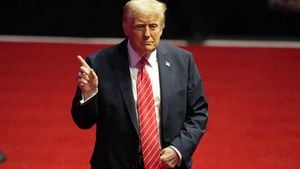On January 20, 2025, President Donald Trump made headlines by signing an executive order aimed at ending birthright citizenship for children born to undocumented immigrants. This controversial directive, which seeks to reinterpret the 14th Amendment of the U.S. Constitution, threatens to strip citizenship rights from thousands of newborns, potentially leaving many families vulnerable and confused about their legal status.
The executive order, named "Protecting the Meaning and Value of American Citizenship," is set to apply to any children born after February 19, 2025. Its announcement was met with immediate backlash from legal experts and advocacy groups, who argue it constitutes a significant departure from established constitutional principles dating back over 150 years. Critics are particularly concerned about the grave consequences for newborns, including potential denial of access to healthcare and basic social services.
The phrasing of Trump's order indicates two categories of infants may be excluded from citizenship: those born to undocumented mothers and undocumented fathers, and infants born to mothers who are temporarily present for specific reasons but whose fathers lack citizenship or permanent residency. This redefinition of citizenship could complicate the process of securing important documentation for these children, such as birth certificates and Social Security numbers, effectively rendering them stateless.
Wendy Cervantes, immigration policy expert at the Center for Law and Social Policy, expressed deep concern over the potential fallout of such policies. "Any attempt to undermine birthright citizenship through executive order would be unprecedented and even if stopped by the courts, would still harm newborn babies, denying them access to the health care and supports necessary during their early years," she stated. "The consequences of removing citizenship rights could ripple throughout society, impacting families of all backgrounds."
Legal experts assert Trump’s order is directly conflicting with the 14th Amendment, which guarantees citizenship to all persons born on U.S. soil. This principle was firmly established by the Supreme Court nearly 130 years ago through the landmark case of United States v. Wong Kim Ark. Legal scholars point out the dangers of Trump's unprecedented overreach, as evidenced by the immediate lawsuit filed by the American Civil Liberties Union (ACLU) on the very night of the order’s announcement.
“Denying citizenship to U.S.-born children is not only unconstitutional; it's also a reckless and ruthless repudiation of American values,” said ACLU Executive Director Anthony D. Romero. “This order seeks to repeat one of the gravest errors in American history, by creating a permanent subclass of people born in the U.S. who are denied full rights as Americans.”
The ACLU's lawsuit highlights civil rights organizations' deep-seated fears about the long-lasting ramifications of Trump's attempts to end birthright citizenship. California Attorney General Rob Bonta and New York Attorney General Letitia James echoed these sentiments, promising to fiercely contest the executive order. “He can’t undermine it with executive authority. That is not how the law works,” Bonta asserted.
The controversy surrounding Trump's action connects to wider themes within American society, particularly the age-old discourse surrounding immigration and race. Many proponents of the executive order claim it is necessary for national security and economic reasons, arguing against what they perceive as 'birth tourism'—an illegitimate industry enabling non-citizens to exploit the system. Conversely, critics assert these viewpoints are rooted more deeply in racial prejudice than empirical data.
Trump's directive could also provoke fears among families of immigrants already residing within the U.S. Many new parents are left uncertain about their children’s future. One couple from New Hampshire, who recently applied for asylum, articulated their worries: "Our baby could be born here, but also be considered undocumented due to our status — it's frightening to think they won't share the same rights as other children born to citizens."
The ACLU’s legal challenge is focused not only on halting the executive order but also on advocating for the fundamental principle behind birthright citizenship — equality under the law without distinction. Activists and advocacy groups are preparing for what they predict will be protracted legal battles. They maintain confidence, asserting, “We will not let this attack on newborns and future generations of Americans go unchallenged.”
Trump's executive order is also indicative of larger, systemic issues within the United States concerning immigration law. By declaring birthright citizenship as problematic, it raises questions about the very definition of American identity. The potential effects extend beyond legal rights; they signal the creation of lasting societal divides based on race, immigration status, and socioeconomic factors.
Opponents argue birthright citizenship is central to the legacy of the United States and its founding principles: inclusion, equality, and justice for all. For many, to undermine these principles means risking the very fabric of the nation, which has thrived through diversity and acceptance.
The future of birthright citizenship lies at the intersection of legal, political, and social challenges. Whether or not Trump's executive order withstands scrutiny remains to be seen, but what is abundantly clear is the deep ramifications for countless families and the continued discourse on the American identity.



